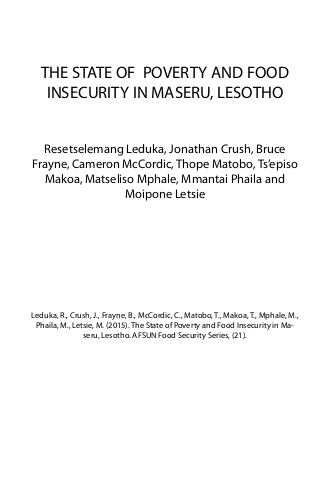Urban Food Security Series | #21

This report is the latest in a series on Southern African cities issued by AFSUN. Like the previous reports, it focuses on one city (Maseru) and on poor neighbourhoods and households in that city. The AFSUN Urban Food Security Baseline Survey, on which this report is based, was implemented in Maseru in late 2008. The findings are still relevant to contemporary Lesotho for the following reasons:
- there is no evidence that the urban food security situation has improved in the intervening years and there are strong reasons for thinking it has deteriorated; food imports are up, remittances from South Africa are down and employment in Maseru’s garment factories has been declining;
- the AFSUN survey was undertaken towards the end of the global and regional food price cri- sis of 2007-2008, which had a strong negative impact on the food security of poor urban populations. An analysis of what this meant for households in Lesotho is imperative since food price increases and dramatic spikes are certainly not a thing of the past and need to be planned for; and
- by drawing attention to the nature and magnitude of urban food security in Lesotho’s capital, this study can contribute to the reformulation of food security policy in the country as both a rural and urban issue and as both a food production and access issue.
Links
Resource collections
- UN Habitat - Urban Response Collection
- Urban Response - Urban Crisis Preparedness and Risk Reduction
- Urban Response Collection - Community Engagement and Social Cohesion
- Urban Response Collection - Economic Recovery
- Urban Response Collection - Environment and Climate Change
- Urban Response Collection - Housing, Land and Property
- Urban Response Collection - Urban Crisis Response, Recovery and Reconstruction
- Urban Response Collection - Urban Resilience